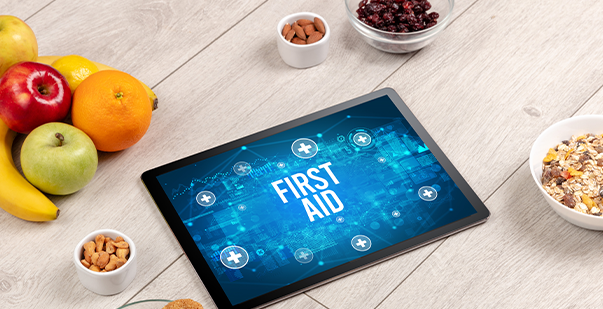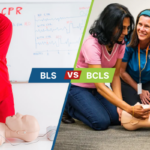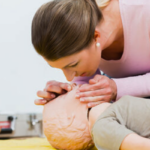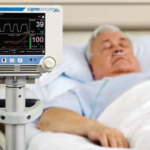
- Last Updated On: February 14, 2024
Why First Aid Training is Crucial for Nutritionists
Achieving a healthy diet is a crucial milestone for a person’s well-being. A nutritionist is a person who studies food and knows its value for the body. But they too must equip themselves with a first aid course. A first aid course for nutritionists helps them ensure their client’s safety. They are also able to deliver comprehensive care during emergencies with ease.
Knowledge of first aid helps them respond quickly and effectively to emergencies. You can register for the First Aid Online Training course available at American CPR Care Academy right away! You can learn this course at your own pace!
What is the daily work of a Nutritionist?
A nutritionist is someone who helps in improving health conditions by providing a diet filled with nutrition for all age groups. Their daily work depends on where they are working: Clinic, Hospital, Private Practice or other settings. Some of their daily work includes:
- Dietary Assessment
- Creating an Individualized Diet Plan
- Guiding people about why nutrition and a healthy diet are important.
- Provide counseling about dietary and healthy lifestyles.
Could their diets cause medical emergencies and how?
Diets aim to enhance health and well-being. But, certain dietary practices or individual circumstances can lead to potential medical emergencies. Here are a few examples of how diets could lead to such situations:
- Allergic Reactions: Certain food can give rise to an allergic reaction in the body. Some individuals have severe food allergies. These can result in anaphylaxis, a life-threatening allergic reaction.
- Nutrient Deficiencies: Inadequate intake of essential nutrients can lead to various health complications. For instance, severe deficiencies in vitamins such as vitamin C (scurvy) can cause serious medical issues that require immediate intervention.
- Malnutrition: Not eating proper meals for long can cause malnutrition. Every meal should include carbohydrates, proteins and fats. It must also have micronutrients (vitamins, minerals) that can result in malnutrition.
- Eating Disorders: Certain diets can contribute to the start of eating disorders, like anorexia nervosa, bulimia nervosa, or binge eating disorder.
- Dehydration: Lack of water in the body leads to various health issues. Diets that promote excessive fluid restriction can lead to dehydration.
Nutritionists must assess individual needs. They must consider pre-existing medical conditions or allergies, and provide tailored dietary guidance. This approach cuts the risk of potential medical emergencies associated with specific diets.
List of medical emergencies that could occur?
Most nutritionists focus on promoting healthy eating and well-being. But, they too can encounter various medical emergencies throughout their career. Here is a list of potential medical emergencies that nutritionists could encounter:
1. Allergic Reactions
2. Choking
3. Hypoglycemia: Sudden drops in blood sugar levels
4. Hyperglycemia: High blood sugar levels
5. Cardiac Events
6. Seizures
7. Fainting or Loss of Consciousness
8. Anaphylaxis
9. Heat Stroke or Heat Exhaustion
10. Hypertensive Crisis
11. Food Poisoning
12. Medication Reaction
13. Trauma
While this list covers some potential medical emergencies, it is important to note that each situation may vary, and nutritionists should always seek professional medical assistance when encountering emergencies beyond their scope of practice.
Which life-saving skills should a certified nutritionist take?
A certified nutritionist should get various life-saving skills by receiving proper training and certification. Here are some essential life-saving skills that a certified nutritionist should consider:
- Cardiopulmonary Resuscitation (CPR): CPR is a fundamental life-saving technique used to revive individuals who have experienced cardiac arrest or stopped breathing.
- Automated External Defibrillator (AED) Use: A certified nutritionist should undergo training in operating an AED, which delivers an electric shock to restore a regular heart rhythm in cases of sudden cardiac arrest.
- Choking Response: A nutritionist needs to know how to respond to choking incidents.
- First Aid for Allergic Reactions: Nutritionists should be well-versed in recognizing and managing severe allergic reactions, including anaphylaxis.
- Basic Wound Care: It is important to hold a basic knowledge of wound care, such as cleaning, dressing, and controlling bleeding.
- Recognition of Medical Emergencies: Nutritionists should be trained to recognize signs of medical emergencies such as heart attacks, strokes, diabetic emergencies, and seizures.
Conclusion
In conclusion, nutritionists should prioritize taking a first aid course to enhance their ability to handle emergencies and ensure the well-being of their clients. Acquiring life-saving first aid skills such as CPR, AED use, choking response, and basic wound care equips them to provide immediate assistance when faced with critical incidents.
One reputable provider of first aid courses for professionals, including nutritionists, is American CPR Care Association. They offer a range of comprehensive courses that meet the specific needs of healthcare professionals. By enrolling in their courses, nutritionists can gain valuable knowledge and certification in first aid, empowering them to respond in emergency scenarios and further their commitment to client care and safety.






